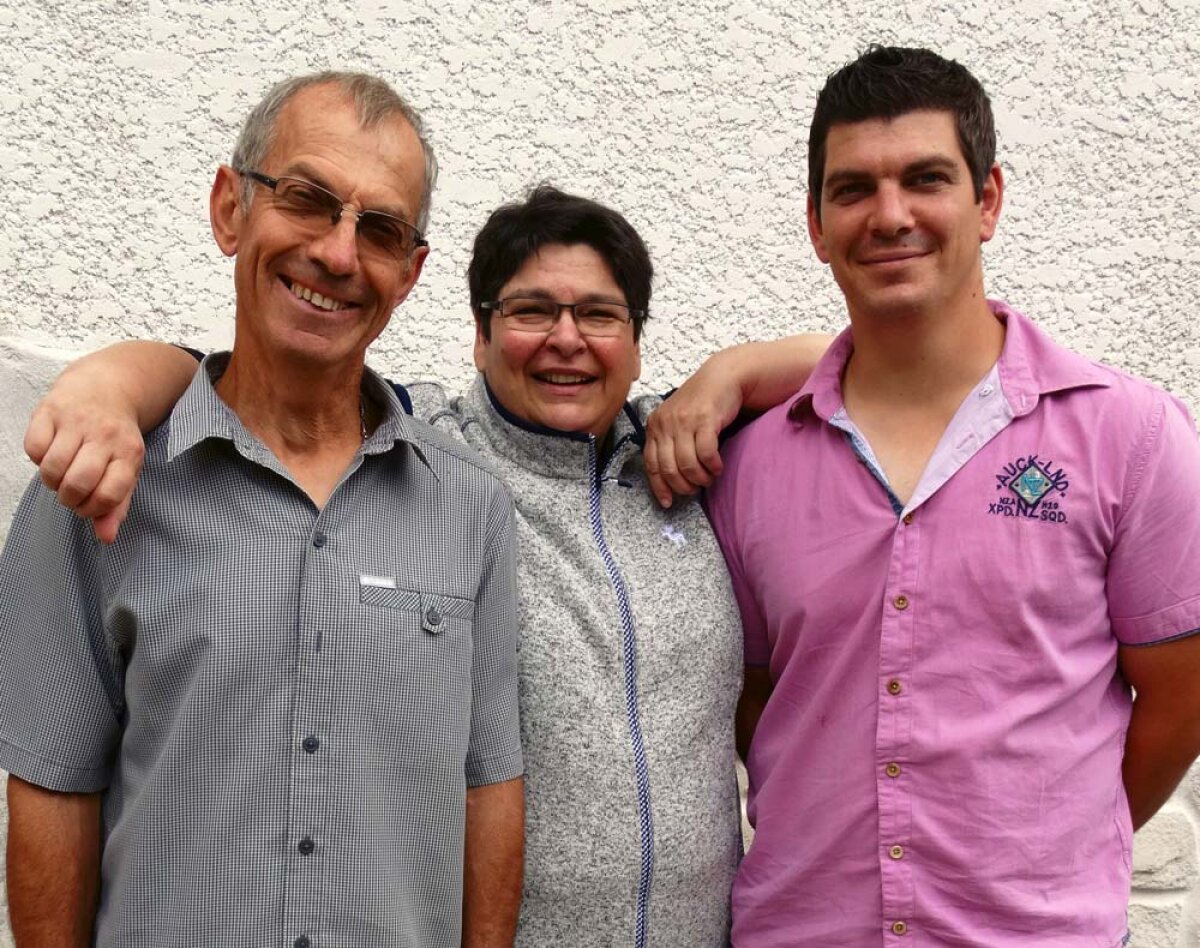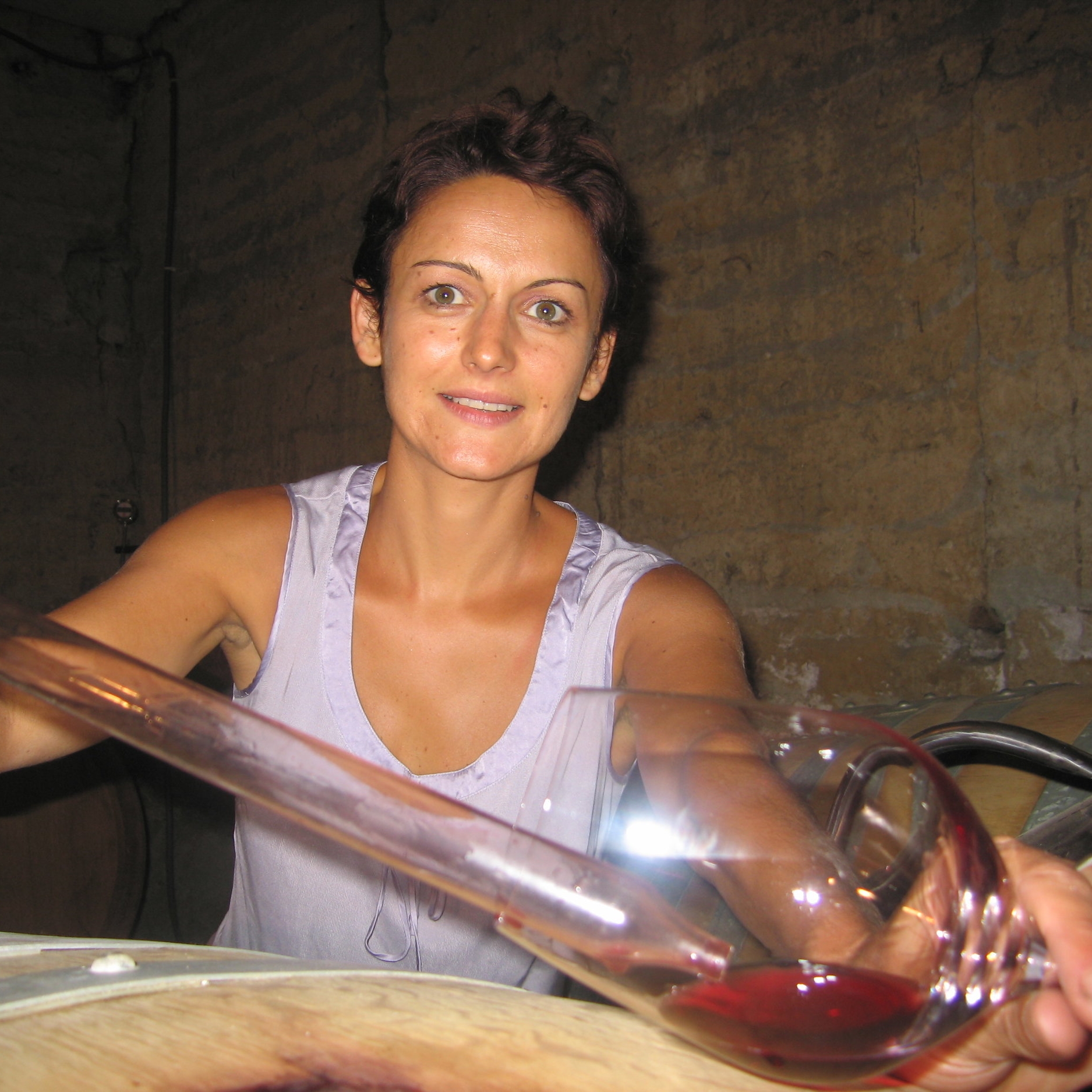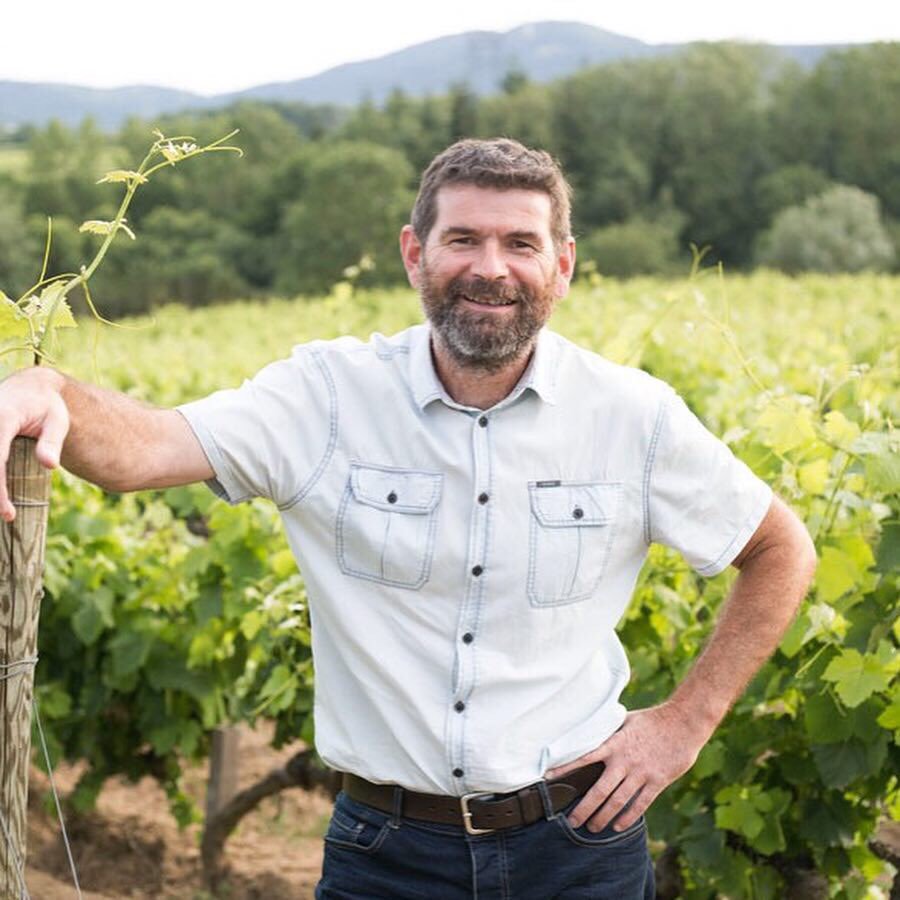RHONE VALLEY - SEPTENTRIONALE + ARDECHE + MERIDIONALE
RHONE VALLEY - SEPTENTRIONALE + ARDECHE + MERIDIONALE
DOMAINE CLUSEL-ROCH (AMPUIS)
DOMAINE NATACHA CHAVE “ALEOFANE” (MERCUROL)
NICOLAS BADEL (VERNOSC-LES-ANNONAY)
DOMAINE JOHANN MICHEL (CORNAS)
DOMAINE LES DEUX TERRES (VILLENEUVE DE BERG)
DOMAINE MARCEL RICHAUD (CAIRANNE)
CHATEAU GIGOGNAN (SORGUES)
DOMAINE CLUSEL-ROCH (AMPUIS)
BIODYNAMIC
—
2020 AOC Coteaux du Lyonnais Rouge - “Traboules” (Gamay)
2019 AOC Côte Rotie - “Les Schistes” (Syrah, Viognier)
2012 AOC Côte Rotie - “Classique” (Syrah, Viognier)
2019 AOC Côte Rotie - “Vialliere” (Syrah)
2012 AOC Côte Rotie - “Vialliere” (Syrah)
2019 AOC Côte Rotie - “Champon” (Syrah)
2019 AOC Côte Rotie - “Les Grandes Places” (Syrah)
2012 AOC Côte Rotie - “Les Grandes Places” (Syrah)
Read More...
Based in Verenay, south of Lyon, this family run wine estate is an exciting new addition to our Northern Rhone Valley selection. Run by the same family since the 1940's, Domaine Clusel Roch is now under the reins of Gilbert Clusel, his wife Brigitte Roch and their son Guillaume who joined the domaine in 2009 after finishing his studies in "vine and wine".
The Clusel Rochs are fervent farmers and passionate wine growers. This passion for the soil, vines, good food and wines follows a strong family ethos, heralded most prominently by Rene Clusel who in 1969, began bottling under the Domaine Clusel, his single hectare of vines from the legendary Vineyard " Les Grandes Places'' planted with a low yielding clone of Syrah called Serine. According to Gilbert, being less productive these vines give more complex aromas than the modern selections. The family have long been believers in the advantages of organic farming and have been pioneers of the movement within the region. In fact they had fully converted to this process as far back as 1990, and certified Biodynamic since 2002. The vines are processed almost entirely by hand with no chemical fertilizers used. Instead the soil is tilled with picks, hoes and hand-plows in the steepest slopes of the Rhone. Medicinal herbs are planted between the vines to prevent disease, acting like natural pesticides and showing a deep understanding of the local environment.
The vineyards are located in the Northern part of the appellation also called the Côte Brune, as opposed to the south called the Côte Blonde. The soils include iron-rich mica-schist and clay which are darker in colour, hence the name Brune (brown). This unique terroir tends to produce more complex, powerful and dense wine, yet refined and intensely mineral. About a third of the Clusel-Roch's vineyards have vines more than thirty years old. The rest are of younger vines, less than twenty years old. To best express the qualities of the vineyard, the domaine only replants grapes from their own selection of Serines which come from their own nursery (located on the property) and are grafted from their vines in 'Les Grandes Places'. Roughly 4% Viognier vines are interspersed among the Syrah.
In the winery, they use indigenous yeast for all the wines, because they believe that these are the natural components of the land. For the pressing they use a vertical press for the finest results. The Côte-Rôtie wines are aged for min. 2 years in 228 litres french oak barrels which are around 25% new oak. In 2014, Guillaume decided to extend the estate by renting vineyards and started a small project of making wine from the 'Coteaux du Lyonnais appellation' that lies between Lyon and Vienne. Guillaume found an old abandoned vineyard of Gamay and decided to create less-expensive wine that still bears his own signature style. This beloved domaine is producing some of the most elegant wines in the most natural way possible whether on the vertiginous slopes of the Côte-Rôtie or on the gentle hillsides of the Coteaux du Lyonnais.
DOMAINE NATACHA CHAVE “ALEOFANE” (MERCUROL)
BIODYNAMIC
—
2021 AOC Crozes Hermitage Rouge (Syrah)
2021 AOC St Joseph Rouge (Syrah)
2021 AOC Cornas (Syrah)
2020 AOC Cornas (Syrah)
Read More...
In 2004, at the age of 28, Natacha Chave started her own domain. This fledging vigneronne bought 1.3 hectares of vines among the hilly fertile soils of Saint-Joseph in Northern Rhône. Just three years later, in 2007, she grew her domain, purchasing another 6.5 hectares of old vines in the Crozes-Hermitage appellation, where she added some new plantings as well.
Winemaking is in her blood. Her parents realised their dream of making wine in the 1970s, when they established a small winery in Crozes-Hermitage. Her older brother, the eminent Yann Chave, later took over their parents’ estate. Rather than join the family business, Natacha desired independence and to make wine free of limitations. She had her eye set on the region in which she grew up, the Northern Rhône, where she believes the perfect expression of her favourite grape Syrah can be found.
Because of the steep hills of her vineyard, none of the farming can be mechanised, and so Natacha farms meticulously by hand, while following biodynamic practices. The soil is a mix of clay and alluvial stones, and her wines are fermented on wild yeasts, with low oak handling and using all old wood. She uses sulphur as minimally as possible, and the wines are bottled without fining or filtration.
Natacha uses only natural additives in the vineyard. In 2006, she began using a treatment made from fenugreek seeds, which helps the vines develop a resistance to phylloxera, and she has also experimented with a treatment made from yucca, chitin, and tea tree oil.
In speaking about where the name of her domain, Aléofane, stems from, Natacha says: “It's an island imagined by John MacMillan Brown in his book, Riallaro: the Archipelago of Exiles. I took this literary reference to name the wine I wanted to make. The description corresponded to the controversy about wine in our society. It's a product shared with conviviality, but obeys strict rules. In the city of Aléofane, fermented drinks are considered as diabolic and rare goods but possessing healing properties.”
NICOLAS BADEL - DOMAINE LES GRANDS VIGNES (VERNOSC-LES-ANNONAY)
ORGANIC
—
2021 IGP Collines Rhodaniennes (Marsanne)
2021 AOC Condrieu (Viognier)
2021 IGP Collines Rhodaniennes (Syrah)
2021 IGP Collines Rhodaniennes “Rochegrand” Rouge (Syrah)
2021 AOC St Joseph Rouge “Les Mourrays” (Syrah)
Read More...
"My domain covers 7 hectares of vineyards and the quality of its terrains is quite startling. This reasonable size vineyard is managed as close as possible to the physiology of vine, betting on soils life and cycles, by using many plant species which contribute, day after day, to our own balance and to the liveliness of the vegetal life. The grape will then enjoy a strict processing until it is bottled, thanks to up-to-date equipment and a very functional cellar. The final touch derives from subtle and precise maturations. For me, the Domain’s philosophy can be summed up in a single word: “Harmony"!
To produce very good wine, three elements are needed: good grapes, good grapes and good grapes! With this as a target, you need a wide terroir and to work hard on the vine. The geographical situation (altitude, latitude...), the exposure to the sun, the environment are all crucial elements that constitute this terroir. Structure and depth of the soil will allow vine to root well, which is needed for the balance of the plant as far as nutriments and water are concerned. I have been fortunate enough to work with people who know the vineyards well and who are sensitive to the vine’s needs. From our love for this vineyard, from the accuracy of our work on the vine derive the quality of each cuvée, from the work atmosphere we create.
The specificity of my various terroirs determines the grape variety I choose for each plot of land. I adapt the vivacity and the production of my vines to the terroirs and to the balance needed for each grape variety. Managing the vineyard evolves around managing the various pruning, the competition of a vine with another, adapting the grassing, working the soil at the vine’s foot, green harvesting, stimulating immune defence system of vine while respecting the production process for organic farming, while respecting life!
Being rigorous in the cellar, training constantly, visiting other domains, all this allows me to refine my vinification processes and to be efficient in the cellar. I have chosen to use proven technology equipment, to produce genuine wines. In the vineyards, close to nature, humility and respect are a must... It is a growing pleasure and an immense privilege to live out of one’s passion. I wish you as much pleasure tasting the wines as we have had growing our grapes." Nicolas Badel - winemaker.
DOMAINE JOHANN MICHEL (CORNAS)
ORGANIC
—
2020 AOC Saint Peray (Marsanne, Roussanne)
2020 AOC Saint Peray “Cuvee M” (Marsanne, Roussanne)
2021 AOC St Joseph Rouge (Syrah)
2020 AOC Cornas (Syrah)
2020 AOC Cornas “Jana” (Syrah)
2020 AOC Cornas “Mere Michel” (Syrah)
Read More...
Johann Michel is a self-taught winemaker, with a long family lineage of vignerons in Northern Rhône. His great-grandfather François Michel was one of the founders of the Cornas appellation in 1938. Johann first discovered his passion for wine while tasting old bottles with his grandfather and his uncle, notable winemaker Robert Michel, who was the fourth generation of the Michel family to work as a vigneron in the village of Cornas.
Johann took over a portion of his family’s estate, making his first vintage in 1997. He now farms 4.17 hectares under the ‘Lutte Raisonnée’ method in the lieux-dits ‘Les Cotes’, ‘Bayonnet’, ‘Chaillot’, and ‘Saveaux’ under the Cornas AOC.
Cornas is one of the smallest appellations in all of France, and is known for its earthy Syrah—the only grape that can be grown on the steep sand, granite, and limestone slopes of the west side of the Rhône River. Because of this verticality, machinery can not be used, so the 40-year-old vines are tended to by hand. The ‘Lutte Raisonnée’ method is mostly organic, but un-certified, and sometimes engages the use of synthetic chemicals. He does incorporate some biodynamic practices, such as using a cooper treatment on the vines.
Johann works to keep his yields low (of which the region is already notoriously low at 33 hl/ha), resulting in intensely concentrated grapes to wines that are a true expression of this powerful terroir. His 100% whole bunch wines are aged in demi-muid barrels for around 15 months, and bottled unfined but lightly filtered.
DOMAINE LES DEUX TERRES (VILLENEUVE DE BERG)
MINIMAL INTERVENTION
—
2021 Vin de France “Vin Nu Blanc” (Chardonnay, Ugni Blanc)
2021 Vin de France “Vin Nu Rouge” (Grenache)
2021 Vin de France “Zig Zag” Syrah, (Grenache)
2021 Vin de France “La Reboule” (Grenache, Cabernet Sauvignon, Merlot)
Read More...
Domaine Les Deux Terres is the collaborative vineyard of two winegrowers, Vincent Fargier and Manu Cuni, who decided to stop selling their grapes to the local co-op and start making their own wine together.
Les Deux Terres means ‘the two lands’, a reference to the unification of their two adjoining vineyards. Their winery is situated in Villeneuve-de-Berg, a tiny commune in the heart of Ardèche department in the Auvergne-Rhône-Alpes region. Inspired by their natural winemaker neighbours like Le Mazel, Andrea Calek, and Gilles Azzoni, Les Deux Terres makes wine with very low interventions and an utmost respect for the fruit.
The pair met in 1997 at the Agriculture School of Aubenas. Vincent, who grew up around family vineyards, was managing the school’s cellar, while Manu was at the school to learn. Quickly forming a friendship, they found jobs working together at Domaine Vallon des Glauges in the Alpilles in Provence. Here, Vincent was hired as chef de culture (vineyard manager) and Manu worked in the cellar. After four years, they both left to work for other domains, Vincent at Domaine de Triennes and Manu at Domaine du Deffends. At these two domains, they were still neighbours, as the vineyards shared a winery, as well as vineyard tools and tractors.
In 2009, their dreams to start a domain together were realised, when Vincent’s father (who had been selling grapes to the local co-op) wished to retire. Vincent took over his father’s vineyard and decided to make wine. At this same time, Manu was renting parcels, and the grower (who also sold to the co-op) also wanted to retire. Now, together, they farm 13-hectares of grapes (partly owned, party rented) across Vincent’s clay-limestone soil and Manu’s basalt soil.
The rough limestone terrain of the steep slopes yields tiny harvests with the grapes struggling to survive in the harsh terroir and without irrigation. All of Manu and Vincent’s grapes are farmed organically, harvest by hand, and fermented with indigenous yeasts. They add a little sulphur to the rosé, but otherwise their effortlessly drinkable wines are labelled ‘vins sans soufre’.
DOMAINE MARCEL RICHAUD (CAIRANNE)
ORGANIC
—
2017 AOC Côtes du Rhône Villages Cairanne Blanc (Roussanne, Vermentino, Viognier)
2021 AOC Côtes du Rhône Rouge - "Terre d’Aigles" (Grenache, Syrah, Carignan)
2020 AOC Côtes du Rhône Rouge - "Terre de Galets" (Grenache, Syrah, Carignan, Mourv., Counoise)
2017 AOC Côtes du Rhône Villages (Cairanne Rouge Grenache, Mourv., Carignan, Syrah, Counoise)
2020 AOC Côtes du Rhône Villages Cairanne Rouge (Grenache, Mourv., Carignan, Syrah, Counoise)
2016 AOC Côtes du Rhône Cairanne - "Cuvée l’Ebrescade" (Grenache, Mourvedre, Syrah)
2020 AOC Côtes du Rhône Cairanne - “Cuvée l’Ebrescade” (Grenache, Mourvedre, Syrah)
Read More...
Cairanne produces many of the best wines made in the Côtes-du-Rhône Villages AOC, and Marcel Richaud has been a pioneer of natural winemaking on Cairanne terroir.
From a very young age, Marcel was passionate about viticulture and winemaking, and dropped out of high school at the age of 17 to study viticulture. He always felt a special energy in the vineyard, and believed that his life was in Cairanne, that wine from the region could be something special, and that he was destined to be the one to make it.
Today, Marcel farms 55 hectares of Mourvèdre, Grenache, and Shiraz vines atop a range of low hills, with perfect sun exposure and slightly cooler temperatures than the lower plain (Plan de Dieu), which experiences extreme heat. This domain is partly his vineyard (which he inherited from his parents), and partly his neighbour’s land, which he rents.
Marcel has been following organic process for almost 40 years, and his production methods are certified Biologique by Ecocert. Through his winemaking, Marcel pays reverence to his grapes and the beautiful terroir from which they stem. In the winery, he has experimented with pigéage, remontage, carbonic maceration, oak, cement, stainless steel, and more, but believes that what really makes great wine is the soil structure, the yields, the age of the vines, and that if left unrestrained by sophisticated vinification techniques, these elements will allow the terroir of a region to be beautifully expressed.
As an advocate and member of the Association des Vins Naturels, Marcel believes that real wine should see no chemical treatment, filtering, commercial yeasts, or other techniques that would specifically alter a wine.
Along with Mourvèdre, Grenache, and Shiraz—which he blends to allow for a greater level of balance and finesse—he grows 10% Cinsault and 15% of various local varietals. In the winery, each grape is vinified individually, before being blended about eight months later.
CHATEAU GIGOGNAN (SORGUES)
ORGANIC
—
2021 AOC Côtes du Rhône Blanc (Roussanne Blend)
2019 AOC Chateauneuf-du-Pape Blanc - "Clos du Roi" (Roussanne Blend)
2020 AOC Côtes du Rhône Rouge (Grenache, Mourvedre, Shiraz, Cinsault)
2019 AOC Chateauneuf-du-Pape - “Clos du Roi” (Grenache, Syrah)
2016 AOC Chateauneuf-du-Pape - “Cardinalice” (Grenache, Syrah)
Read More...
Located in the town of Sorgues, Château Gigognan sits among the Châteauneuf-du-Pape AOC—the best known appellation in Rhône Valley. The foundation for the entire appellation d'origine contrôlée system is based on rules outlined in 1923 by Baron Le Roy of nearby Château Fortia.
The château once belonged to the Jesuit community and was built atop the foundation of a centuries-old monastery. Its history dates back to the time of Roman colonisation.
Some of the vineyards on the estate were planted more than one hundred years ago, and are these days farmed using organic and biodynamic practices, with the the Ecocert certification awarded for whole estate in 2010.
The 30 hectares of vines in Châteauneuf-du-Pape grow in rocky soil studded with galets roules, or pebbles, covering clay. The estate’s other 42 hectares sit within a small valley in the Côtes-du-Rhône appellation, with sand and limestone soils.
The estate grows a mesh of red and white varietals, including Grenache, Syrah, Mourvèdre, Cinsault, Carignan, Roussane, Marsanne, Clairette, Viognier, and Bourboulenc. Grapes are hand-harvested to very low yields (20 hl/ha), and are de-stemmed before fermenting in temperature-controlled tanks and wooden vats with a 10-day maceration period.
Quality and environmental responsibility are the driving forces behind the estate, which sees each vine managed with respect and in line with the natural rhythms of the terroir.








